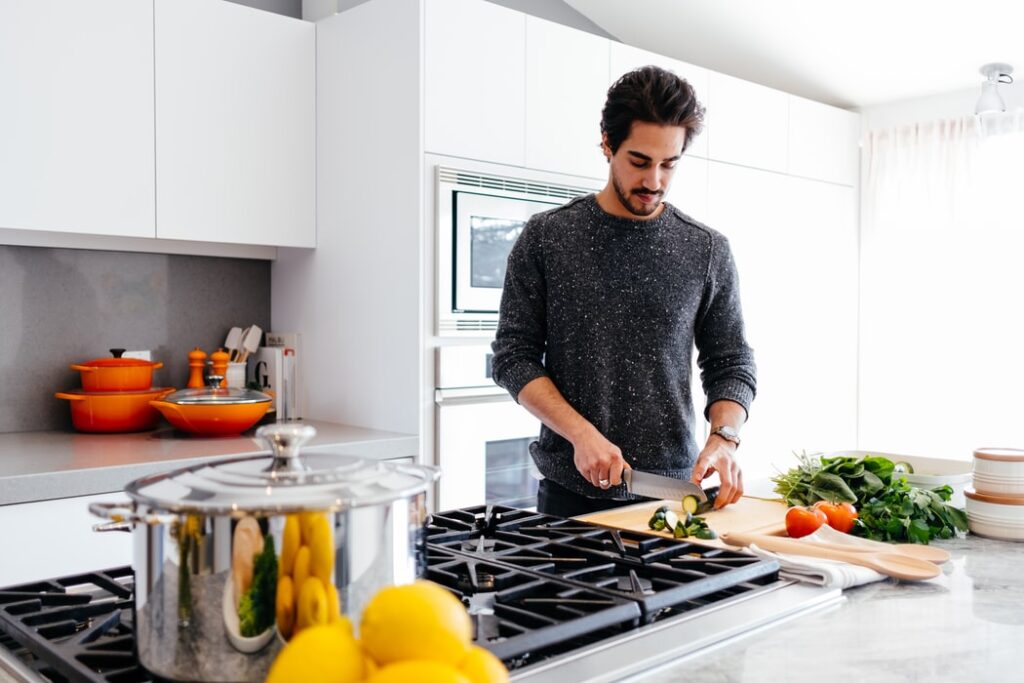
Every recipe claims to be “easy.”
But, even for “easy” recipes, there’s still the splatter of batter on the floor, the charred remnants of chocolate on the stove, or the cookies that disintegrate upon pulling them out of the oven.
I’ve been cooking and writing about food for years, and all those mistakes you just read? They were mine.
RELATED: How to Meal-Plan For One (and Save Money)
So, take a deep breath. You will make mistakes, but (hopefully) delicious ones. The only thing you need to do is start. Here’s what you need:
What you need in your kitchen
It’s taken years (and a huge wedding registry) to build up my kitchen to where it is today. Did I need a ravioli maker? No…but it’s one of those things that makes life fun.
The first step is to set yourself up for success with the right equipment. If I’ve marked it with an asterisk, it’s worth spending up for the highest quality item you can afford. Higher quality means it’s more likely to last — I’m still using my grandmother’s stand mixer from the 1970s!
For Bakers
- 1 handheld mixer (or stand mixer if you can make an investment)*
- 2 sheet pans* and a cake pan
- Parchment paper or silicone mats
- A trusty spatula*
- A set of measuring cups, spoons, glassware, and mixing bowls
For Cooks
- 1 Dutch oven* (or this more affordable one)
- A wooden spoon*
- A set of saucepans and pots, at least 1 large and 1 small of each*
- 1 wooden cutting board* and 1 plastic cutting board
- A high-quality chef’s knife, bread knife, and paring knife* (or this more affordable set)
- A grater or microplane
What you need in your pantry
When I stare at my refrigerator wondering what I should eat, it’s my pantry that saves me from takeout. With these, there are very few recipes I can’t pull together.
- Diced tomatoes. You can do anything with diced tomatoes.
- Grains serve as the foundation for any dish, so I always have pasta, quinoa, rice, and noodles on hand.
- Beans. They add protein and you can use them in almost any dish. I try to have a variety on hand, but I usually buy chickpeas, white beans, and black beans, which cover the bases.
- Onions and garlic. Every recipe starts with onions, no matter where in the world you’re cooking from.
- Cheese. It makes everything taste better. A wedge of parm and some butter suddenly become adult mac and cheese, so you know it’s a magical ingredient.
- Baking essentials: Flour, sugar, baking powder, baking soda, and vanilla can give you most cookies and cakes, along with eggs and other types of dairy. I also always have chocolate chips on hand…you never know when the need for chocolate chip cookies will strike!
What you need in your spice cabinet
When you’re wondering what differentiates a good cook from a great one, it’s spices. It will take practice to know how much to use when, but if you have these on hand, you’ll be able to cook anything:
- Salt: You need to use way more salt than you think you do.*
- Fat: Olive oil*, coconut oil, and lots of butter.
- Acid: Lemons and white vinegar are musts, and I always have some balsamic vinegar*, soy sauce, and rice vinegar around, too.
- Flavor: It’s worth keeping thyme, cumin, chili powder, paprika, curry powder, cinnamon, and garlic powder around. That will cover most of what you need, whether you’re whipping up coq au vin or chana masala.
What you need on your bookshelf
Learning to cook takes practice, and the best way to do that is to find cookbooks or blogs you love and work slowly from there. I learned to cook from my grandmother, but Mark Bittman’s aptly named “How to Cook Everything” filled in the gaps. For baking, I turn to “The King Arthur Flour Baker’s Companion” by PJ Hamel and it hasn’t failed me yet. And while I didn’t learn to cook from Samin Nosrat, her book (and now a Netflix series!) “Salt, Fat, Acid, Heat” changed how I thought about putting together meals, so I’d add it to your list.
Originally published on May 27, 2020.